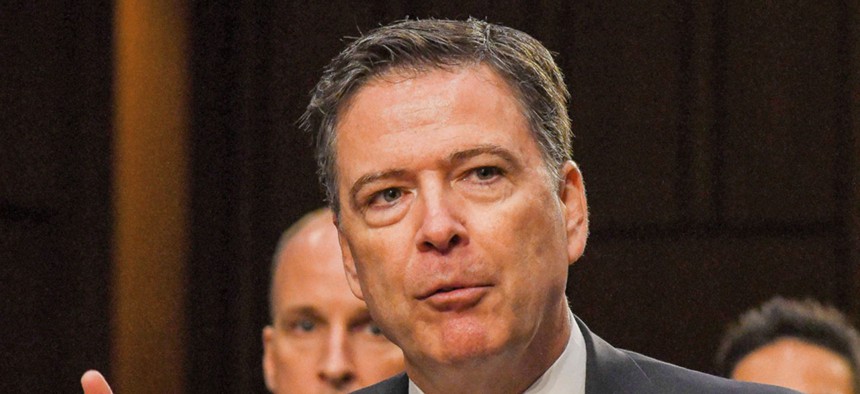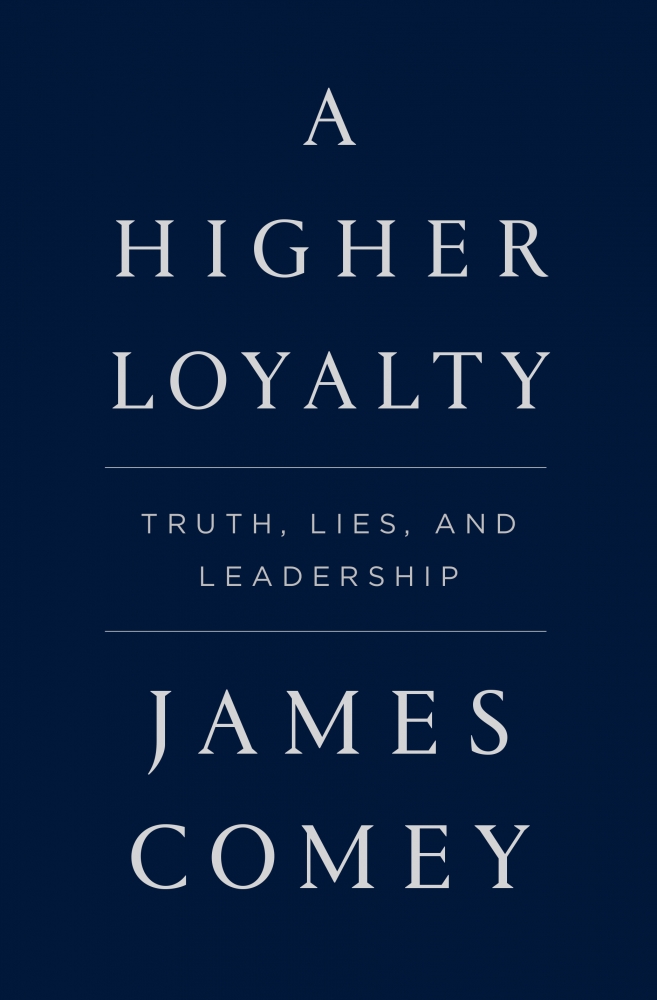
mark reinstein / Shutterstock.com
Five 'Ethical Leadership' Values In James Comey's Book
Whatever you think of the fired FBI chief, his exploration of leadership is worthy of reflection.
Former FBI Director's James Comey's book A Higher Loyalty was released Tuesday to huge sales and heavy criticism from Comey's former boss, President Donald Trump. The news coverage of the book has mostly been about Comey's reflections on his involvement in the 2016 presidential race and his interactions with Trump, but the book's main theme, as articulated in the subtitle "Truth, Lies and Leadership," deals with management. An engaging storyteller, Comey intertwines autobiographical stories with thoughts on ethical leadership in government.
Comey writes about what he calls "ethical leadership" and notes that great companies "obsess over leadership talent—they hunt for it, test it, train it, and make it part of every conversation. They treat leadership talent like money."
What does Comey see as important components of ethical leadership? Here are five main takeaways:
1. The best leaders don't overreact to mistakes and use them as teaching moments.

In the third chapter, Comey writes about his early life and his first job at a grocery store in New Jersey. He loved his job, something he attributes to the store manager's leadership, saying "I still think Harry Howell was one of the finest bosses I have ever had." Comey discusses an incident when he broke an expensive piece of equipment—new (in the 1970s) pricing gun technology. Howell responded firmly, but fairly:
The gun smashed into pieces…There are many leaders, and I’ve known a few in my life, who would have lost it, hurling expletives and accusations at a stupid kid. As Harry looked down at the plastic parts now spread around his wing-tip shoes, he said only, “Clean it up,” and walked away. I don’t remember him asking for an explanation or mentioning it again. My sixteen-year old self concluded that Harry immediately realized I had been scammed; in his stoic, suppressed-smile way, he understood that I’d been the victim of a slightly mean prank and pitied me.
Maybe the guns really weren’t expensive, or maybe Harry made my coworker pay for the one that I tossed. But Harry’s grant of mercy left a lasting impression and made me love him more. I worked even harder, making the paper aisle a Bounty-filled paradise.
Comey recounts another incident at the store with him spilling gallons of milk while trying to move too many cartons at once. Again, instead of exploding, Howell used the situation as a teaching opportunity:
I was minutes into mopping when Harry appeared. He stood on the far side of Lake Milk, hands on hips, careful not to get any on his wing tips. After an eternity of admiring the lake, he asked, “Have you learned something?”
“Yes, sir,” I replied.
“Good,” he answered. “Clean it all up.” And he walked away.
Of his first boss, Comey writes, "Harry Howell had power, and he wielded it with compassion and understanding. That wasn’t always easy for him, because he had to deal with a lot of immature kids. "
2. Leaders create an environment where people want to do their best work.
Comey notes that Howell created a positive atmosphere:
He created an environment that was both demanding and incredibly fun. He suppressed a smile at our silliness—just letting the corner of his mouth turn up slightly so we could see his amusement—and told us bluntly when our work wasn’t good enough. We loved him. But we also feared him, in a healthy way.
It's not surprising that a national security professional would value fearing a leader "in a healthy way," but Comey's explanations of Howell reflect Comey's view on leadership. In his author's note, he waxes philosophical about the optimal environment leaders can foster for employees to do their best work.
Ethical leadership is also about understanding the truth about humans and our need for meaning. It is about building workplaces where standards are high and fear is low. Those are the kinds of cultures where people will feel comfortable speaking the truth to others as they seek excellence in themselves and the people around them.
While it may be hard to imagine a staff of teenagers would search for meaning in their work stocking shelves, Comey's experience shows that in the right environment, people (and their work) can thrive regardless of the circumstances.
3. Leaders value humor that shows both confidence and humility.
In Comey's introduction, he tells a story about when he was FBI director and he and Greg Brower, the FBI’s then new head of congressional affairs, were on their way to a 2017 meeting to brief Congressional leaders about Russian interference in the 2016 presidential election. Comey tried to break the tension by booming "HOW GREAT IS THIS?" and used some offhand profanity to calm his colleague. By joking, Comey said he changed the dynamic from a boss and an underling to "we were two people on a road trip" and "everything was going to be okay."
Comey notes that a leader's sense of humor is a guide to the leader's values.
A sense of humor in particular strikes me as an important indicator—or “tell”—about someone’s ego. Having a balance of confidence and humility is essential to effective leadership. Laughing in a genuine way requires a certain level of confidence, because we all look a little silly laughing; that makes us vulnerable, a state insecure people fear. And laughing is also frequently an appreciation of others, who have said something that is funny. That is, you didn’t say it, and by laughing you acknowledge the other, something else insecure people can’t do.
By appreciating others' contribution, being open to looking silly and showing vulnerability, a leader can connect with others. Comey writes of each of his bosses who've occupied the Oval Office and their senses of humor. One of his first mentions of President Barack Obama includes the president breaking the tension during the event announcing Comey's nomination to the FBI director post.
With a serious look on his face, Obama turned to me and said, “Jim, there’s one thing I forgot to talk to you about.”
While I looked confused, the president nodded toward Mueller. “Bob long ago made a commitment to me, and I need you to honor it.” What could this possibly be? The president had assured me of my independence. Now I was being asked for secret assurances?
The president paused to signal the gravity of the moment. The he went on. "Bob has always allowed me to use the FBI gym to play basketball, and I need you to commit to continuing that."
Comey contrasts Obama's sense of humor with George W. Bush's. While complimenting Bush on his ability to break tension with jokes, Comey also notes that Bush sometimes used humor to assert himself:
President Bush had a good sense of humor, but often at other people’s expense. He teased people in a slightly edgy way, which seemed to betray some insecurity in his personality. His teasing was used as a way to ensure that the hierarchy in his relationship with others was understood, a strange thing given that he was president of the United States, and it was a sure way to deter his people from challenging the leader’s reasoning. President Obama could laugh with others, and, as with President Bush, poke fun at himself in some circumstances, such as when Bush told fellow “C students” at a commencement address, “you, too, can be president of the United States.”
Much has been made of the book's gossipy details of Comey's feelings about the man who fired him. Comey does examine Trump's leadership style and his sense of humor – or lack of it – during his infamous one-on-one dinner with the president.
I don’t recall seeing [Trump] laugh, ever. Not during small talk before meetings. Not in a conversation. Not even here, during an ostensibly relaxed dinner. Months later, the thought of a man whom I had never seen laugh stayed with me. I wondered if maybe others had noticed it or if in thousands of hours of video coverage, he had ever laughed… I don’t know of another elected leader who doesn’t laugh with some regularity in public. I suspect his apparent inability to do so is rooted in deep insecurity, his inability to be vulnerable or to risk himself by appreciating the humor of others, which, on reflection, is really very sad in a leader, and a little scary in a president.
Comey clearly doesn't think much of Trump's sense of humor—or his leadership.
4. Leaders listen to dissenting opinions or facts.
Comey says he learned a lot about listening first from his wife. In a chapter titled "The Washington Listen," Comey cites the importance of actually listening to others, as opposed to the method many politicians employ when they are simply waiting to make their own prearranged point:
True listening is actually that period of silence and allowing someone’s words to reach your conscious brain, but it also includes something else that’s a little weird: with your posture, your face, and your sounds, you signal to someone, “I want what you have, I need to know what you know, and I want you to keep telling me the things you’re telling me.”
Part of how effective leaders listen, according to Comey, is by showing humility in the face of opposite views and by asking questions:
As I’d seen from other leaders, being confident enough to be humble—comfortable in your own skin—is at the heart of effective leadership. That humility makes a whole lot of things possible, none more important than a single, humble question: “What am I missing?” Good leaders constantly worry about their limited ability to see. To rise above those limitations, good leaders exercise judgment, which is a different thing from intelligence. Intelligence is the ability to solve a problem, to decipher a riddle, to master a set of facts. Judgment is the ability to orbit a problem or a set of facts and see it as it might be seen through other eyes, by observers with different biases, motives, and backgrounds.
Comey doles out some of his highest praise in A Higher Loyalty for Obama. Comey says he did not vote for the 44th president, and he was surprised by the president's intelligence and leadership. He writes that Obama was truly engaged in discussions on hard topics:
I watched [Obama] work hard to draw as many viewpoints as possible into a conversation, frequently disregarding the hierarchy reflected in seating arrangements—principals at the table, lower-ranked folks in chairs against the wall… Obama hunted for points of view. Maybe it was a legacy of his life as a professor, cold-calling someone in the back row. This approach often led to chaotic conversations, but it allowed him to hear views that, in the Bush administration, would have been watered down by rank or by fear of being teased.
5. Leaders take the long view.
Comey's view of ethical leadership is largely outlined in the author's note at the beginning of the book: "I have learned that ethical leaders lead by seeing beyond the short-term, beyond the urgent, and take every action with a view toward lasting values." Comey continues with the structures on which leaders rely.
They might find their values in a religious tradition or a moral worldview or even an appreciation of history. But those values—like truth, integrity, and respect for others, to name just a few—serve as external reference points for ethical leaders to make decisions, especially hard decisions in which there is no easy or good option. Those values are more important than what may pass for prevailing wisdom or the groupthink of a tribe. Those values are more important than the impulses of the bosses above them and the passions of the employees below them. They are more important than the organization’s profitability and bottom line.
Comey's views were shaped by theologian Reinhold Niebuhr. Coupling Niebhur's "obligation to try to seek justice in a flawed world" with a utilitarian view of serving the most good for the most people, Comey examines the leader's need for constant improvement:
Without a fundamental commitment to the truth—especially in our public institutions and those who lead them—we are lost. As a legal principle, if people don’t tell the truth, our justice system cannot function and a society based on the rule of law begins to dissolve. As a leadership principle, if leaders don’t tell the truth, or won’t hear the truth from others, they cannot make good decisions, they cannot themselves improve, and they cannot inspire trust among those who follow them.







